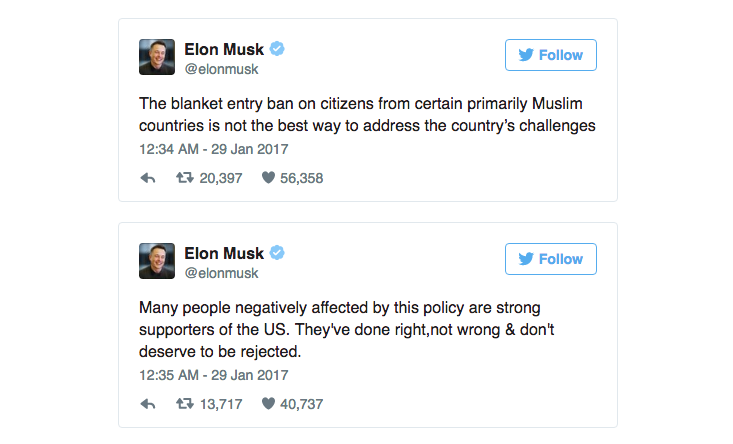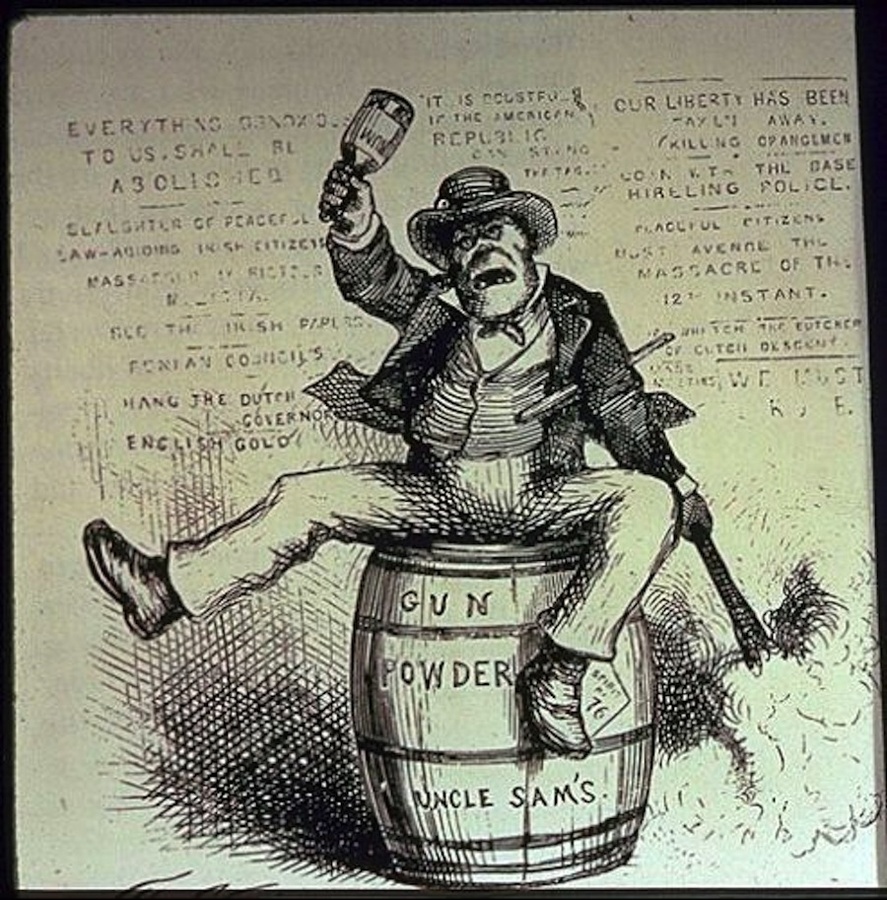Wall Street veteran Joshua Brown believes Trump’s Muslim ban is another wave in a long legacy of American xenophobia. “The irony of a country built by immigrants building walls to keep out specific types of immigrants should be lost on no one,” he wrote in a LinkedIn post addressing his “Jewish, Irish, Asian and Italian friends”.
“I work on Wall Street and live on Long Island. I am surrounded by people who can’t recognise how recently their own ancestry and ethnicity would have been a problem for them. Are you one of them?” he asks rhetorically.
“Unhire-able. Undesirable. Laws were passed to allow for the mass discrimination and segregation of your great grandparents, not much more than a century ago,” Brown reminds readers in his open letter. According to Brown, many of the American citizens who are all for Trump’s Muslim ban who may have Italian, Jewish, Asian and Irish heritage are being myopic. Their forebears were considered “human garbage” on the streets of New York, Philadelphia and Boston, he says. “It wasn’t all that long ago when mainstream politicians were actively seeking ways to get rid of you too.”
Legal battles
With Trump’s attempt at instilling a Muslim ban, people were held for hours in airports, people were trapped in limbo in other countries, and parents were separated from their children because of where they were born, or the religion they practice. In response, lawyers rushed to airports and offered their services for free – often using the floor as their temporary office.
The furore over Donald Trump’s efforts in trying to ban Muslims from entering America spurred a crack team of lawyers to step up to halt the ban, albeit temporarily. If the legal battles ahead go the right way, these lawyers could stop families from being torn apart, and possibly temper the rising tide of xenophobia.
One of the organisations behind Trump’s first defeat is the American Civil Liberties Union. They’re experts in protecting the rights of ordinary people. Their track record includes taking on the KKK, exposing torture and standing up for freedom of speech. It was the ACLU who persuaded a judge to block Trump’s ban late on Saturday night.
Diversity may take a hit
The effect of Donald Trump’s immigration restrictions on workplace diversity remains to be seen, but according to Warwick Business School’s Shainaz Firfiray, xenophobia usually marks the beginning of the end.
“Increasing globalisation requires that organisations develop a diverse workforce so they are well-positioned to meet the needs of a diverse customer base. An obvious implication is that a lack of diversity in the workforce can hurt business competitiveness and shrink its market share. One could argue that several companies wouldn’t have been so successful without immigration and the ability to leverage diversity,” Dr Firfiray, associate professor of organisation and human resource management, explains.
“Managing diversity effectively is not important merely for addressing customer needs, but also because diverse work groups produce better business results compared with homogeneous work groups,” she says. “In fact, the success of most businesses hinges on their ability to acknowledge, accept and manage disagreements among employees with diverse backgrounds, develop new ideas and approaches and in doing so build on their knowledge and creativity.”
According to Faegre Baker Daniels’ US immigration attorney Claire Nilson, Trump’s campaign promise to build a wall to keep Mexican immigrants out is just as damaging to diversity. “Following through on some of his campaign promises, President Trump signed executive orders aimed at an array of immigration and border related activities including the building of a wall along the Mexican border, increased immigration enforcement and security vetting, the hiring of more border officials, and the use of local law enforcement in immigration enforcement including punishing those who refuse to comply. This appears to be the start of his following through on the protectionist promises that he made to the American public.”
She believes that this could “lay the groundwork for tinkering with the work visa categories upon which many US employers and British workers in the United States rely with a view to protecting American jobs.”
Muslim ban: corporate decisions
For Starbucks chair and CEO, Howard Schultz, “the promise of the American Dream (is) being called into question” with this ban. In a statement he issued to all Starbucks employees, he stated that the company plans to hire 10,000 refugees over five years in 75 countries.
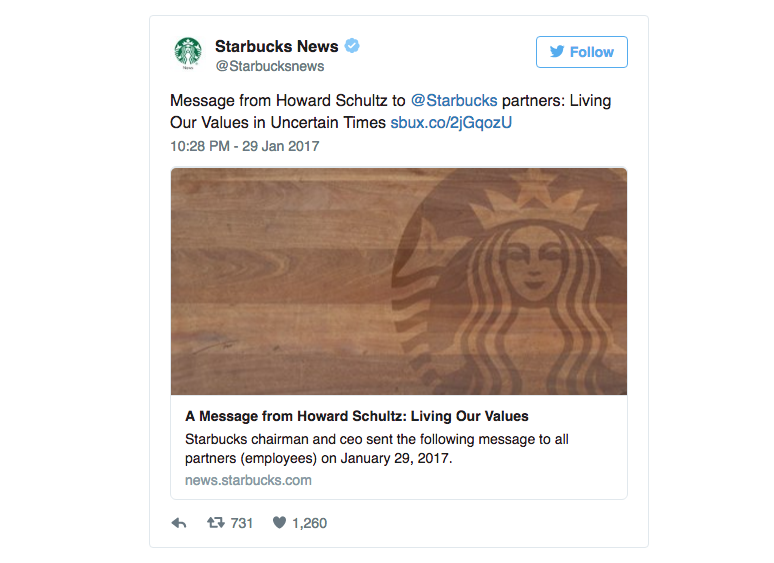
While many customers took to social media to commend Starbucks, others threatened to boycott after the letter’s release. Comments on a Yahoo Finance article stands testament.
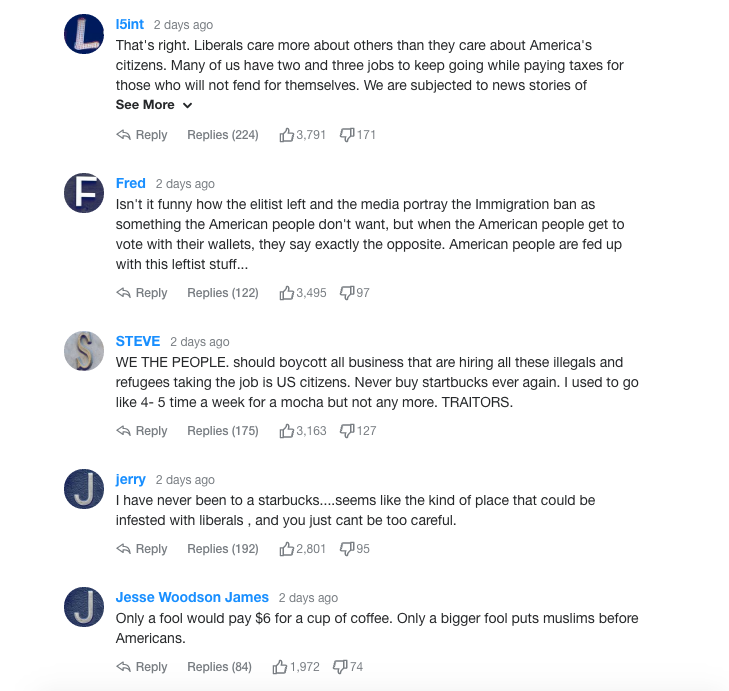
From Mark Zuckerberg to Elon Musk, American business leaders expressed their fear and concern for their nation. “We should also keep our doors open to refugees and those who need help. That’s who we are,” Facebook’s Mark Zuckerburg said.

For Netflix CEO Reed Hastings, it has been “a very sad week,” while Airbnb CEO Brian Chesky offered to house refugees for free. “Airbnb is providing free housing to refugees and anyone not allowed in the US. Stayed tuned for more, contact me if urgent need for housing,” he tweeted.
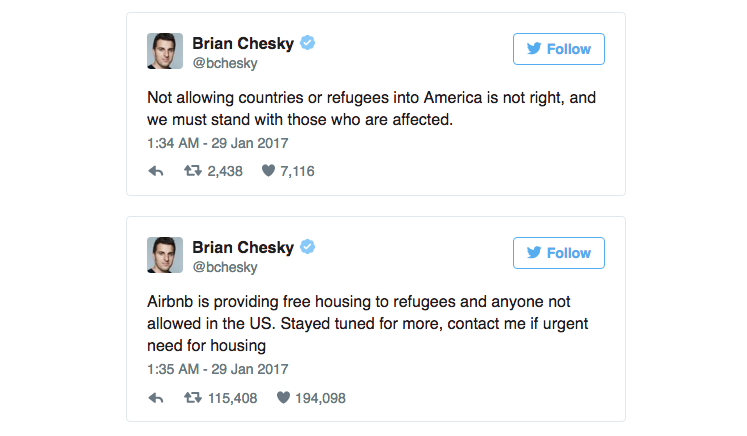
According to Google’s parent company, Alphabet, the executive order could affect close to 200 of its employees. “It’s painful to see the personal cost of this executive order on our colleagues,” said Google CEO Sundar Pichai.
As a member of Trump’s business advisory team, Tesla CEO Elon Musk said he would offer suggestions to the president at the group’s next meeting on Friday. “The blanket entry ban on citizens from certain primarily Muslim countries is not the best way to address the country’s challenges,” he tweeted.
